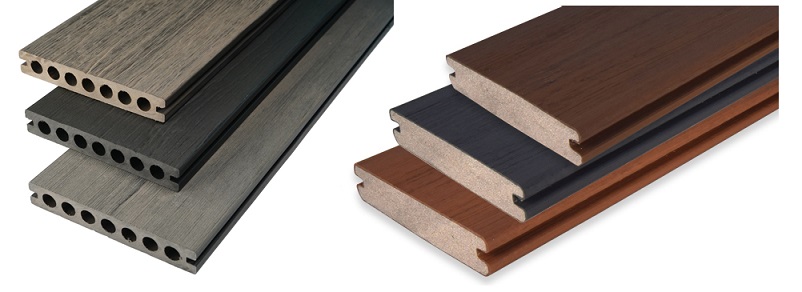If you’re in the market for new garden decking, chances are you’ve already been faced with a cornucopia of options from our good friends at Google & Sons Plc.
A simple online search can fire back enough options to leave you feeling like a kid in a candy store; however, before you appease that sweet tooth and put your money where your mouth is, it’s worth knowing what’s what.
So, cash in that golden ticket and join us as we take an unrestricted tour of the decking landscape and put hollow vs solid decking head-to-head.

Unlike hollow decking, solid composite decking is commonly split into two distinct categories: capped decking and uncapped decking.
While both look visually stunning and provide ample protection against a number of environmental demands, there are distinct differences between the two.
Comprised of a “composite” material consisting of recycled wood and synthetic materials, uncapped composite decking offer aesthetic beauty in a wide variety of authentically stylish designs.
Better still, these blended boards also offer impressive low-maintenance durability that is robust enough to maintain that look for literally decades to come, a fact proven by a 25-30 year warranty.
Slip, fade and abrasion-resistant, these boards are extremely resistant to the elements and will never warp or bow, nor will they ever split, splinter or crack.
Also known as non-capped composite, uncapped decking has sat atop the outdoor flooring landscape as the king of decking since its invention in the late ‘90s.
That is until the arrival of the next decking innovation…
Capped composite decking is, from a durability point of view, the daddy of the decking world.
Thanks to the protective polymer sleeve that covers each and every board, capped decking boasts unrivalled durability, resistant to even more elemental demands than its predecessor.
Capped composite decking offers everything uncapped offers and more, notably benefitting from enhanced moisture protection.
The polymer sleeve gives each board an extremely long-lasting aesthetic, providing you with the lowest maintenance decking available.
Spills and splashes can simply be wiped clean without leaving a single trace that anything was there. Even red wine and food grease wipes clean instantly!
Meanwhile, the virtually impermeable surface also makes it highly resistant to algae, mould and mildew, providing you with a blemish-free deck that lasts.
Outside of solid composite decking, the alternative option is hollow composite decking. A fairly new innovation in its own right, hollow composite decking provides an economical solution to outdoor flooring, while still maintaining a high standard in terms of aesthetics and practicality.
In addition to the impressive natural-looking design, hollow composite decking provides the low-maintenance benefits of solid composite decking at a fraction of the price, due primarily to its hollow structure.
Due to the hollow channels featured through each board, hollow composite decking uses considerably less material. While this conservational approach contributes to the lower cost, it also makes them more environmentally friendly.
The hollow nature may lead you to naturally think that it would impact the structural integrity of the boards; however, this isn’t the case. Each board is still reliably robust and resistant to stains, fades and abrasions.
Hollow vs Solid Decking
While hollow and solid decking have their own perks, from elemental resistance to eco-friendly properties, the choice ultimately comes down to one major difference and that’s pricing.
Hollow decking is considerably less expensive than both its solid counterparts, in some cases boasting a price tag that’s an incredible 75% cheaper. That being said, solid composite decking is a safe investment, with a warranty that guarantees it quite literally lasts a generation.
Perhaps the most important factor that could influence your decision is how long you intend to stay at your property. All varieties of composite decking are built to last; however, the length of the warranties is indicative of just how long that is.
Hollow composite decking typically has a guarantee of 5 to 10 years, while solid composite decking has a considerably longer lifespan of 25 to 30 years. Naturally, the price correlates with this increase, so it pays to be smart when choosing which deck is right for you and your future plans.
If you view your property as a permanent residence you see as your “forever home”, a long-term investment like the capped composite may be well worth it; however, if you plan on moving elsewhere within the next decade, hollow may be the most logical choice.
For more information on hollow vs solid decking, why not drop us a line today? Call 0800 028 8756 now or get in touch online using the button below.
Contact Us